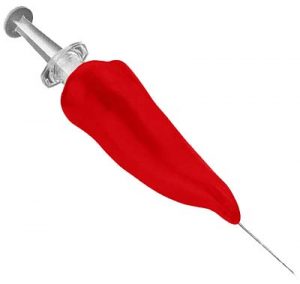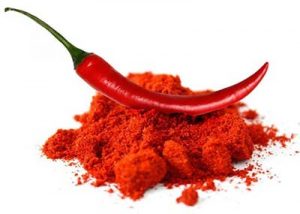Eat more chiles to protect your heart.
 Readers of this column know that chiles’ firepower is matched only by their healing power, at least for minor problems such as colds or lingering nerve pain from viral infections. What you may not know, and what scientists are just finding out, is that a high-heat diet can potentially save your life.
Readers of this column know that chiles’ firepower is matched only by their healing power, at least for minor problems such as colds or lingering nerve pain from viral infections. What you may not know, and what scientists are just finding out, is that a high-heat diet can potentially save your life.
Heart disease kills more Americans than all cancers combined—about half a million each year. Heart attacks occur in an instant, but the underlying damage accnies over decades. Don’t be surprised during your next checkup if your doctor advises you to stock your medicine chest with hot sauces and your produce drawer with jalapenos. These and other culinary firecrackers appear to block buildups of coronary crud and keep the blood flowing.
THE CLOT CONNECTION
One of life’s ironies is that blood clots, which stop bleeding and can save your life, can also kill you. Most heart attacks occur when clots in a damaged section of a coronary artery break free and jam the normal flow of blood to the heart. Doctors often advise patients to take an aspirin every other day because it “thins” the blood and reduces the risk of these deadly clots.
Chiles, it turns out, may have a similar effect. Consider cayenne. Scientists have found in laboratory studies that it inhibits the body’s production of thromboxanes, substances that promote clotting. Cayenne and other chiles also
appear to dissolve clots that have already formed. Indeed, one study found that native Thais, who spice up their diets to almost combustible levels, have more “fibrinolytic activity” (the breakdown of blood-clotting proteins) than those who eat on the mild side.
Here’s another reason to send more peppers past your palate. Capsaicin, the stuff that makes chile hot, is a vasodilator that increases blood flow while lowering its overall force. In other words, it lowers blood pressure. Less pressure means less blood turbulence in the arteries, which means less damage that can lead to clots.
In the future, it’s even possible that doctors will give heart-attack patients a quick shot of capsaicin. Preliminary research shows that capsaicin, injected directly into the area surrounding a clot, can minimize postheart attack damage, says Kris Napier, M.P.H., R.D., editor of the American Dietetic Association’s Cooking Healthy Across America, and author of The Omega’3 Factor and Eat to Heal.
Obviously, the first step in treating most heart attacks is dissolving the clot that’s blocking circulation. But removing a clot, like unkinking a garden hose, causes a sudden rush of pressure; blood pours out with artery-damaging force. Scientists who work with laboratory animals report that an injection of capsaicin reduces what’s known as “reperfusion injury.” With capsaicin, it may be possible to eliminate clots while minimizing harmful turbulence at the same time.
CUT TO CHOLESTEROL
 Even though blood clots are the direct cause of most heart attacks, the clots themselves are largely caused by cholesterol, the waxy goo that sloshes around in the blood and clings to blood vessel walls. Unless you’ve been out of town for the last decade or so, you know the usual advice: Eat less fat, cut back on burgers and fries, and load up on beans, grains and produce.
Even though blood clots are the direct cause of most heart attacks, the clots themselves are largely caused by cholesterol, the waxy goo that sloshes around in the blood and clings to blood vessel walls. Unless you’ve been out of town for the last decade or so, you know the usual advice: Eat less fat, cut back on burgers and fries, and load up on beans, grains and produce.
OK, boring. Here’s something a little more interesting: Chiles may help. There’s good evidence that capsaicin lowers blood levels of LDL, the harmful form of cholesterol that clings to blood vessel walls. At the same time, it raises levels of beneficial HDL cholesterol while lowering triglycerides, blood fats that have been linked to heart disease.
Admittedly, most of this research has been’done on animals, not humans, and the best results occurred when chiles were added to diets that were already low in fat. But even if you rank Cheez Whiz and buffalo wings among the major food groups, you might want to keep a bowl of salsa next to the remote control. Studies have shown that laboratory animals given a high-fat diet tend to gain less weight and have significant drops in triglycerides when chiles are added to their diets.
“Chiles contain significant amounts of phytochemicals that are extremely important in battling heart disease,” Napier adds. They’re loaded with vitamin C and carotenoids-chemical compounds that prevent buildups of coronary goo. Even when arteries are already coated with nature’s equivalent of Crisco, a chile- rich diet can help prevent blood-blocking clots.
I asked Napier to cut through the scientific jargon and give the readers of Chile Pepper some practical advice. “Eat chiles until your eyes water,” she says. “Then go back for more.”
